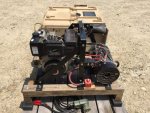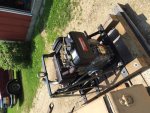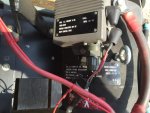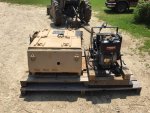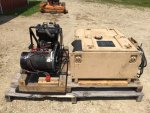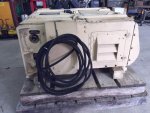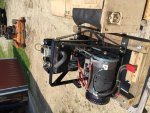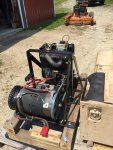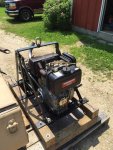90cummins
New member
- 28
- 0
- 1
- Location
- Florida Ma.
I subscribe to various forums and most people think they need 10~20 kw's to operate their home.
While 10+kws' may be necessary if you have an whole house auto back-up generator that must be able to start motors and compressors in refrigerator's, freezers & AC units they consume a huge amount of fuel when being used for prolonged outages even with little or no-load placed on them.
A large 12 or 16kw propane unit may consume 1 or 2 gallons an hour with no load.
For a long term outage you should be thinking about minimizing your consumption and sizing a secondary generator to operate at a minimum of 50~60% of full rated load to handle (absolutely essential loads) for maximum fuel efficiency.
That figure may be small as 2 to 5 kw.
For that I would suggest a Military MEP diesel generator or a Yanmar 3.7 or 5kw unit.
Diesel fuel can be stored safely long term and is easily obtained.
I have the following for my backup plan.
I have an L70 Yanmar driving a 5kw head that provides 3.7kw.
I have performed fuel consumption tests on my generators in order to know how many gallons of fuel I need to have on hand and which one to use depending on my kw needs..
My L70 Yanmar @ 3.54kw load runs 2.4 hrs/gal.
L70 Yanmar @ 1.01kw load runs 4.6 hrs/gal.
I also built a 24v DC generator for my battery backup system using a Yanmar L100 driving a Niehoff N1603 alternator rated 450amps at 28v.
Currently I'm running the engine at 2650rpm and the alternator at 1450rpm, with a 1.01kw AC load I get 5.3 hrs/gal.
This setup working in unison with my batteries will support my home
My informed 2 cents!
90cummins
While 10+kws' may be necessary if you have an whole house auto back-up generator that must be able to start motors and compressors in refrigerator's, freezers & AC units they consume a huge amount of fuel when being used for prolonged outages even with little or no-load placed on them.
A large 12 or 16kw propane unit may consume 1 or 2 gallons an hour with no load.
For a long term outage you should be thinking about minimizing your consumption and sizing a secondary generator to operate at a minimum of 50~60% of full rated load to handle (absolutely essential loads) for maximum fuel efficiency.
That figure may be small as 2 to 5 kw.
For that I would suggest a Military MEP diesel generator or a Yanmar 3.7 or 5kw unit.
Diesel fuel can be stored safely long term and is easily obtained.
I have the following for my backup plan.
I have an L70 Yanmar driving a 5kw head that provides 3.7kw.
I have performed fuel consumption tests on my generators in order to know how many gallons of fuel I need to have on hand and which one to use depending on my kw needs..
My L70 Yanmar @ 3.54kw load runs 2.4 hrs/gal.
L70 Yanmar @ 1.01kw load runs 4.6 hrs/gal.
I also built a 24v DC generator for my battery backup system using a Yanmar L100 driving a Niehoff N1603 alternator rated 450amps at 28v.
Currently I'm running the engine at 2650rpm and the alternator at 1450rpm, with a 1.01kw AC load I get 5.3 hrs/gal.
This setup working in unison with my batteries will support my home
My informed 2 cents!
90cummins
Last edited:




